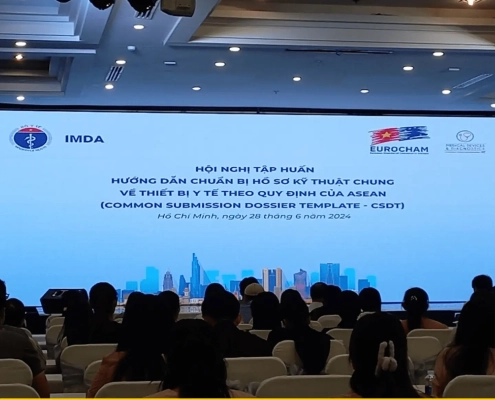Come grow with us in the US in Thailand in China in Korea in the Philippines in Taiwan in Hong Kong
Contact Us
US: +1 512 898-9222
SG: +65 8800-3197
EMAIL: Inquiry@asiaactual.com
Sources and Links
VietNam Requires Resubmission of Many Medical Device Registration Applications
Published on: January 10th, 2022
Thousands of Pending Class B, C, and D Registration Applications Affected
On December 30, the VietNam Ministry of Health (MOH) held a meeting to lay out new plans regarding several key issues to transition all medical devices under the new Medical Device regulations. Since 2017, the MOH had been accepting applications for Market Authorization (MA) Licenses under Decree 36/2016. Some licenses were issued with an effective date of January 1, 2022, but many applications remained under review. Then in November of 2021, Decree 98/2021 was announced with slight changes to the application requirements for MA licenses. So on January 1, 2022 all unapproved Class B, C and D MA License applications have been returned for resubmission for compliance to the new requirements.
Regarding Class A and B devices:
- all pending Class B applications will be returned and must be resubmitted in compliance with Decree 98/2021
- no new application fees will be applied to re-submitted applications
- new Class B registration applications must include a Declaration of Conformity
- new Class B registration applications must now include clinical evaluation report as part of the Technical Summary
- new Class A and B application will be issued a registration number upon submission (immediate approval)
- new Class A and B application which are found insufficient upon post-submission review will be subject to cancellation
Regarding Class C and D devices:
- all pending Class C and D application will be returned to for must be resubmitted in compliance with Decree 89/2021
- no new application fees will be applied to re-submitted applications
- new Class C and D registration applications must now include clinical evaluation report as part of the Technical Summary
The new application requirements are not particularly onerous, however there are an estimated 5,000 Class B applications and 7,000 Class C and D applications affected by this change.
Important Highlights of Decree 98/2021:
- All Class B devices (not covered by a valid Import License) must have a MA License to be imported from Jan 1, 2022. (Note: Class A devices have required an MA License since Jan 1, 2020.)
- Class C and D devices (not covered by a valid Import License) that are listed in Circular 30/2015 (link to list here), must have a MA License to be imported from Jan 1, 2022.
- Class C and D devices that are not listed in Circular 30/2015, can be imported with a Classification Certificate until Dec 31, 2022 after which a MA License will be required.
- Class B MA License application will have the same requirements as for Class A devices starting Jan 1, 2022.
- For Class C and D devices with reference country approval, the technical review is waived. MOH application target proceeding time will be 10 days with reference country approval. (Note: China and Korea have been added to the US, Europe, Japan, Australia and Canada as reference countries.)
- MA Licenses will be issued without an expiration date (instead of the previous 5-year validity period).
- Registration Holders do not need to be the initial importer; and multiple importers/distributors can be authorized under the same MA license.
- Third Party Classification process has been removed and is now the responsibility of the applicant/registration holder.
- Asia Actual recommends manufacturers of all product categories with Reference Country approval seek an MA license as soon as possible as they do not expire, are reviewed quickly, and can be registered with relatively little documentation.
Application Requirements for New Medical Devices
Manufacturers seeking to enter the VietNamese market will have a few potential pathways depending on their product’s classification, category, and current approval status. Classification is based on risk and closely follows GHTF guidelines. More information can be found in Circular 39/2016. Class A and B devices will immediately receive a registration number by the Health Department of the province where the Registration Holder is located. This significantly reduces the review time for Class B devices from 60 days. The provincial MOH office will then conduct reviews of the documentation submitted and recall any products found to not have sufficient documentation.
All Class C and D devices listed in Circular 30/2015 must now apply for a Market Authorization (MA) license prior to importing. MA licenses will remain valid indefinitely.
Class C and D devices not listed in Circular 30 can continue to be freely imported through December 31, 2022 with only a classification document. However, Asia Actual encourages all manufacturers of Class C and D products, including those not listed in Circular 30, seek a MA license sooner rather than later to avoid any delays if there is a swell of applications as the deadline nears. Additionally, since MA licenses do not expire under the new Decree, manufacturers don’t need to worry about renewing in a couple years.
The MOH has also postponed the implementation of CSDT documentation requirement until January 1, 2023. Until then, all MA license applications must include, but are not limited to, the following documents:
- Application Form
- Certificate of Classification, Letter of Authorization, Declaration of Conformity, etc.
- Certificate of Free Sale (CFS)
- Certificate of QMS (ISO 13485)
- IFU and Technical Summary issued by the Registration Holder in VietNamese
- VietNamese labels
Once approved, the MOH will update the disclosure portal within 1 day,
Beginning January 1, 2023, all new Class C and D products will require a MA license prior to importation and applications submitted after this date will need to be submitted in accordance with CSDT. Since registrations won’t expire anymore, Registration Holders should maintain access to latest product information, distribution records, and up to date QMS documentation to ensure timely response should a provincial MOH office request to see anything.
Expedited Review for Products with Reference Country Approval
The MOH has also updated the expedited review process for medical devices with at least 1 Reference Country approval, which includes the USA, Canada, Europe, Japan, or Australia. As part of Decree 98/2021, the MOH extended acceptable Reference Country approval to China’s NMPA and Korea’s MFDS. Products with an approval from at least one of these markets will still need to submit the required documentation (technical summary, label, IFU, brochure until Dec. 31, 2022, then CSDT) but will not undergo a technical dossier evaluation which intends to shorten the wait time from 60 working days to 10.
Transitioning from Import Licenses to MA Licenses
Manufacturers with Import Licenses should apply for an MA license as soon as possible since Import Licenses will expire December 31, 2022 and MA licenses don’t expire. Additionally, since the required documentation for MA licenses during 2022 is the same as it was for Import Licenses, manufacturers should be able to reuse much for the previously utilized documentation. Furthermore, to help manufacturers already on the market make a smooth transition to MA licenses, the MOH will waive technical reviews for Class C and D for products with an Import License.
Application Fees and Target Review Times in VietNam
| DMEC Fees | Standard Review Time | Review Time w/ Reference Country Approval | |
| Class A | VND 1 million US$43 | Immediate | Immediate |
| Class B | VND 3 million US$130 |
Immediate | Immediate |
| Class C | VND 5 million US$216 |
60 days | 10 days |
| Class D | VND 5 million US$216 |
60 days | 10 days |
| Advertising | VND 100,000 US$5 |
5 days | — |
Regulatory and Administrative Reforms
An additional crucial component of Decree No. 98/2021 was MOH’s effort to streamline the registration process and adjust how products are monitored. To improve the application process, the MOH will remove the additional third-party classification requirements, made MA licenses valid indefinitely, permits Registration Holders to designate importers, and abolishes the advertisement approval requirements. Administratively, the MOH will grant provincial offices more oversight over Class A and B devices held in their jurisdiction and will decentralize specialized units to evaluate technical dossiers and improve quality control.
Amendments and Modifications
The Registration Holder will be responsible for providing the MOH with written notice and supporting documents for any of the following changes:
- Change of name or address of Registration Holder
- Changing the name of the owner of the circulation or the name of the owner of medical equipment;
- Change of either the name or address of the medical equipment manufacturer;
- Change of packing specifications;
- Change of warranty facility;
- Change the label or the instructions for use but do not change the purpose of use, indications for use, features, and/or performance of the medical equipment.
These changes will then be made publicly available on the Medical Disclosure Portal within 10 days.
Advertising Regulations
Under Decree 98/2021, all registered medical devices will still need public on the MOH website before using.
Advertisement applications will need to include:
- Manufacturer and Product Information
- Registration Number
- Feature/Effect
- Registration Holder information
- Any Warnings
- Type of Content
- Advertising Content
Additional Notes
Accessories, Components, and Consumables
Under Decree 98/2021, article 1, point 2d, accessories to medical equipment do not need to be registered. Manufacturers can still choose to separately register the accessories or consumables in accordance with their classification but applications with accessories or components included with the main unit will be rejected. Unless the product’s accessories or consumables are readily available on the market from third parties, Asia Actual recommends registering all key accessories/components separately to ensure customers maintain access to the items they need to operate the main medical device unit. Additionally, there are tax benefits to registering the components as medical devices incur a VAT tax of 5% while non-medical equipment is 10%.
Software Will Not Be Regulated
At this time, software is considered a medical device but will not be regulated as Article 3, point 8 of 98/2021 states:
8. The provisions of this Decree on classification, grant of free-sale registration numbers and announcement of eligibility for trading are not applied to:
a. Software (software) used for medical equipment;
b. Medical equipment is bought and sold like normal goods imported in the form of gifts or presents to individuals or organizations other than medical facilities.
Pricing and Tender Disclosure Portals
In recent years, the VietNamese MOH has taken several steps to increase transparency with one of the biggest being the Medical Device Disclosure Portal. This portal provides pricing information for all products on the market including the owner’s selling price, the selling price of each distributor, agent, and the winning bid price at state-owned medical facilities for all organizations and individuals to access and refer to. See Asia Actual’s blog on the topic to learn more about the portal and how to navigate. To enter a tender, local distributors will need to submit an Import License, a MA license or a Classification document dependent on their requirement at the time. Once a winning bid has been determined, it will be the responsibility of the state-owned medical facility to report the final price on the Disclosure Portal.
Decree 98/2021 implements additional measures to improve the oversight of medical equipment prices to better identify inconsistencies such as winning bid prices among similar medical devices at different facilities across the country.
Some of the main updates include:
- Adds medical devices and biological products to the list of items subject to price declaration.
- Details the pricing information required to be declared including the cost of imports or cost of production, management costs, training and retraining costs, warranty costs, expected profit, and final sale price.
- Stipulates that only the owner of the circulation number (Registration Holder) or the distributor authorized by the owner/Registration Holder can publish the maximum price. All other distributors are then prohibited from selling for more than the price announced by the Registration Holder
- Allows competent state management agencies (not only the Ministry of Health) to request additional price information from Registration Holders and Distributors when necessary.
Class C and D Devices That Do, and Don’t, Require a MA License
This is the list of products outlined in Circular 30/2015 and previously required an Import License. These product categories now require Market Authorization (MA) licenses. Per Decree 98/2021, all Class C and D products not found in this list can be imported with only a Classification document until January 1, 2023.
| 1 | X-ray treatment equipment |
| 2 | Endoscopic surgery system |
| 3 | Radiotherapy equipment (Cobalt machine for cancer treatment, Linear accelerator for cancer treatment, Gamma scalpel of all kinds, Radiotherapy equipment of various kinds) |
| 4 | Patient monitor |
| 5 | Infusion pump, Electric injection pump |
| 6 | Scalpel (high-frequency electric, laser, ultrasound) |
| 7 | Surgical microscope |
| 8 | System of prostate surgical equipment |
| 9 | Artificial cardiopulmonary machine |
| 10 | Positioning equipment in surgery |
| 11 | Cold surgical equipment |
| 12 | Infant incubator. Infant warmers |
| 13 | Anesthesia/anesthesia machine with breathing |
| 14 | Ventilation machine |
| 15 | Cardiac pacemaker, pacing |
| 16 | High-pressure oxygen chamber |
| 17 | Extracorporeal lithotripsy system / endoscopic lithotripsy |
| 18 | High intensity ultrasound equipment system for tumor treatment |
| 19 | Dialysis device |
| 20 | Ophthalmic surgical system (Laser Excimer, Phemtosecond Laser, Phaco, vitreous cutter, corneal flap cutter) |
| 21 | Eyeglasses, contact lenses (near, far, chaotic) and contact lens storage solution |
| 22 | Laser treatment machine used in ophthalmology |
| 23 | Types of equipment, long-term implant materials (over 30 days) into the body |
| 24 | Types of devices and materials that interfere with the body belong to cardiology, cranial neurology |
| 25 | X-ray imaging devices |
| 26 | Magnetic resonance system |
| 27 | Ultrasound diagnostic machine |
| 28 | Endoscopic diagnostic system |
| 29 | Cyclotron system |
| 30 | Radioactive isotope diagnostic equipment (PET, PET / CT, SPECT, SPECT / CT systems, iodine-focused iodine concentration devices I 130 , I 131 ) |
| 31 | Refractometer, cornea automatically |
| 32 | Electrophysiological machine (EEG, ECG, electromechanical machine) |
| 33 | Retinal power meter |
| 34 | Meter osteoporsis |
| 35 | Fundus scanners/fluorescence scanner |
| 36 | Ultrasound fetal heart monitor |
| 37 | Respiratory function analyzer |
Come Grow With Us
Asia Actual specializes in helping medical device manufacturers grow their sales in Asia with experienced, bi-lingual commercial and regulatory experts on the ground in each market.
Contact Asia Actual today with any questions on how Decree 98/2021 may affect your business.






